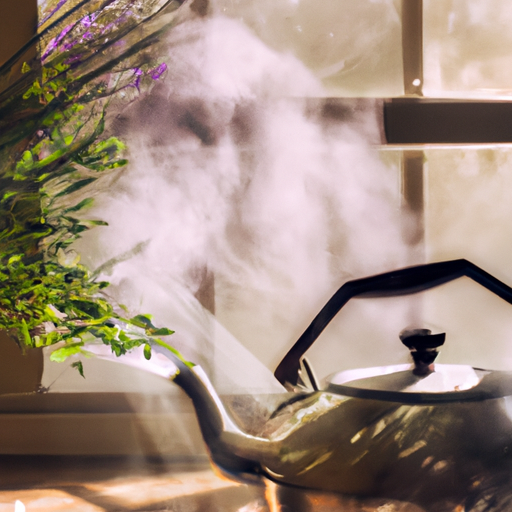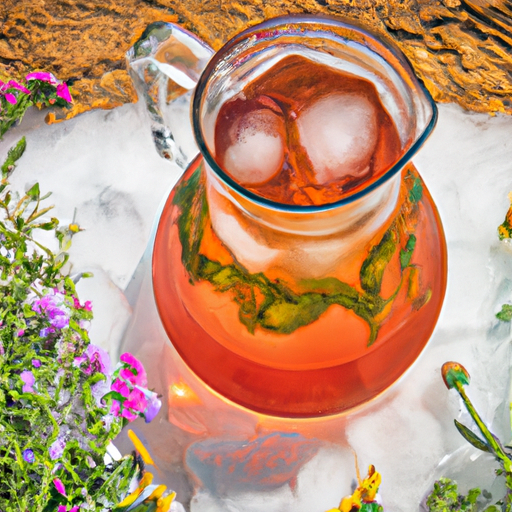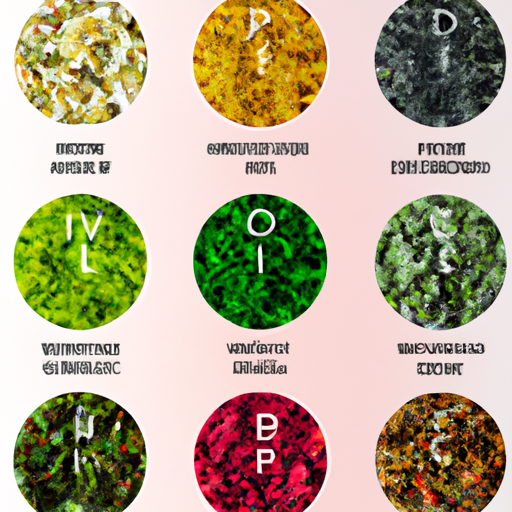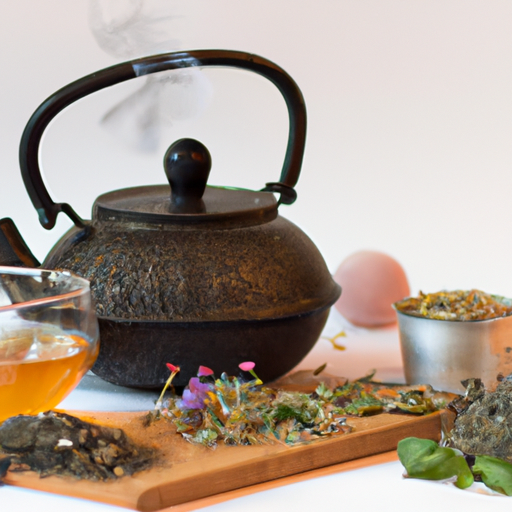Brewing herbal tea is like conducting a symphony of flavors and aromas, where each ingredient plays its own unique melody. As a tea enthusiast, I have honed my skills in the art of brewing herbal teas correctly, and I am here to guide you through the process.
From selecting the right herbs to infusing them with just the right amount of water, every step is crucial in creating a truly delightful cup of tea.
In this article, I will share my expert knowledge on brewing herbal tea correctly. We will explore the importance of choosing the right herbs, measuring them precisely, and heating the water to the optimal temperature.
I will also reveal the secret to steeping the tea for the perfect amount of time and straining the herbs properly. And, for those with a sweet tooth, I will provide tips on adding sweeteners or enhancements to elevate your tea-drinking experience.
So, prepare to embark on a journey of herbal tea mastery. By the end of this article, you will have all the tools and knowledge needed to brew your own perfectly balanced and flavorful cup of herbal tea.
Let’s dive in and discover the art of brewing herbal tea correctly!
Key Takeaways
- Select the right herbs for desired taste and health benefits
- Measure the correct amount of herbs for a balanced flavor
- Steep herbal tea at the optimal temperature and for the right amount of time
- Strain the herbs properly to appreciate the flavors and benefits
Choose the Right Herbs
To brew herbal tea correctly, you’ll want to make sure you choose the right herbs for the flavor and benefits you desire.
There are different types of herbs available, each with its own unique taste and health benefits. For a soothing and calming tea, chamomile or lavender is a great choice. If you’re looking for a boost of energy, try herbs like peppermint or ginseng. For a refreshing and citrusy flavor, lemon balm or lemongrass can be added to your tea blend.
It’s important to do some research on the herbs you’re interested in using to understand their specific health benefits and potential side effects.
Now that you know which herbs to use, let’s move on to the next step – measuring the correct amount of herbs.
Measure the Correct Amount of Herbs
When measuring the precise amount of herbs, it’s important to take into consideration the potency of the blend. This will ensure that your herbal tea has the perfect balance of flavors and therapeutic benefits. To measure the correct amount of herbs, you can use a kitchen scale or measuring spoons.
When it comes to dried herbs, there are different methods for drying them. Air drying is the most common method, where you hang the herbs upside down in a well-ventilated area until they are completely dry. Another method is using a dehydrator, which speeds up the drying process.
Using fresh herbs in your herbal tea can have added benefits. Fresh herbs are more vibrant in flavor and contain higher levels of essential oils, which contribute to their medicinal properties. You can use fresh herbs by simply picking them from your garden or purchasing them from a local farmer’s market.
Once you have measured the correct amount of herbs, it’s time to heat the water to the proper temperature. This will help extract the maximum flavor and therapeutic compounds from the herbs.
Heat the Water to the Proper Temperature
Achieving the perfect cup of herbal infusion starts with heating the water to just the right temperature. Different methods of heating water for herbal tea can affect the taste and quality of the final brew. It is important to choose the right method based on the type of herbal tea you are brewing. Here is a table that shows the optimal brewing temperatures for different types of herbal teas:
| Herbal Tea | Optimal Brewing Temperature |
|---|---|
| Chamomile | 200°F (93°C) |
| Peppermint | 212°F (100°C) |
| Green Tea | 175°F (79°C) |
| Hibiscus | 212°F (100°C) |
| Rooibos | 212°F (100°C) |
By heating the water to the proper temperature, you can bring out the best flavors and aromas from the herbs. This sets the stage for the subsequent step of steeping the tea for the right amount of time.
Steep the Tea for the Right Amount of Time
Get ready to savor the perfect cup of herbal infusion by steeping your tea for just the right amount of time.
Steeping is a crucial step in brewing herbal tea correctly, as it allows the flavors and beneficial compounds to be extracted from the herbs. How to avoid oversteeping? Timing is everything. Different herbs require different steeping times, so it’s important to follow the instructions for each specific herb.
Generally, herbal teas should be steeped for about 5 to 7 minutes. To achieve the perfect infusion, consider these tips: use a timer to ensure accuracy, cover your tea while steeping to retain heat and prevent evaporation, and avoid stirring the tea during the steeping process.
By mastering the art of steeping, you can unlock the full potential of your herbal tea.
Now, let’s move on to the next step: strain the herbs properly.
Strain the Herbs Properly
To fully appreciate the flavors and benefits of your infusion, it’s essential to properly strain the herbs.
There are different methods of straining herbal tea, and the one you choose will depend on personal preference and the tools you have on hand.
One common method is to use a fine mesh strainer or a tea infuser to catch any loose leaves or debris. This method is simple and effective, ensuring a smooth and clean cup of tea.
Another option is to use a cheesecloth or muslin bag to contain the herbs while allowing the tea to steep freely. This method is great for larger herbal blends or if you prefer a stronger infusion.
Whichever method you choose, it’s important to strain the tea as soon as it reaches the desired strength to prevent oversteeping.
Once strained, it’s best to enjoy your herbal tea immediately to maintain its freshness and flavor. If you have any leftover tea, store it in an airtight container in the refrigerator to preserve its taste.
Now that you have perfectly strained herbal tea, it’s time to add sweeteners or enhancements, if desired.
Add Sweeteners or Enhancements, if Desired
Now that you’ve mastered the art of straining, it’s time to elevate your herbal infusion by adding a touch of sweetness or other delightful enhancements to truly tantalize your taste buds.
Exploring different natural sweeteners for herbal tea can bring a whole new dimension to your brew. From the subtle floral notes of honey to the earthy sweetness of maple syrup, there are endless options to experiment with. Not only do these natural sweeteners enhance the flavor of your tea, but they also provide additional health benefits.
Understanding the benefits of adding enhancements to herbal tea is key. Whether it’s a dash of cinnamon for a warming effect or a squeeze of lemon for a refreshing twist, these enhancements can boost your tea’s taste and offer various therapeutic properties.
With your tea perfectly sweetened or enhanced, it’s time to sit back, relax, and enjoy your heavenly creation.
Enjoy Your Perfectly Brewed Herbal Tea
Indulge in the bliss of sipping on your exquisitely crafted infusion, relishing the harmonious blend of flavors and therapeutic properties. Herbal teas not only offer a delightful taste experience but also provide numerous health benefits.
Each type of herbal tea brings its unique flavors and healing properties to the table. For instance, chamomile tea promotes relaxation and aids in digestion, while peppermint tea soothes the stomach and freshens breath. To enjoy a calming and soothing beverage, try lavender or passionflower tea. If you prefer a fruity flavor, hibiscus or berry-infused herbal teas are perfect choices. For a refreshing and invigorating cup, go for a blend of lemongrass and ginger.
By exploring the various types of herbal teas and their flavors, you can create a perfectly brewed cup of tea that suits your taste and health needs.
Frequently Asked Questions
Can I use dried herbs instead of fresh herbs to brew herbal tea?
Yes, you can use dried herbs instead of fresh herbs to brew herbal tea. However, using fresh herbs has its benefits, such as a more vibrant flavor and a higher concentration of essential oils.
What is the best type of water to use for brewing herbal tea?
The best water to use for brewing herbal tea is filtered or spring water at a temperature between 175-195°F. Different types of herbal teas may require slightly different temperatures, so it’s important to follow the instructions for each specific tea.
Can I reuse the herbs for a second infusion?
Yes, you can definitely reuse the herbs for a second infusion. Not only does it save money, but it also allows you to extract more flavor and benefits from the herbs.
Is it safe to drink herbal tea if I have a medical condition or take medication?
As someone with a medical condition, I learned the hard way that herbal tea isn’t always safe. Safety precautions are vital due to potential interactions with medications and medical conditions. Stay informed and consult with your healthcare provider.
Can I mix different herbs together to create my own unique herbal tea blend?
Yes, you can mix different herbs together to create your own unique herbal tea blend. Experimenting with different herbs allows you to customize your tea and enjoy the benefits of their specific properties.
Conclusion
Well, congratulations! You’re now an expert in the art of brewing herbal tea correctly. Who knew that such a simple beverage could require so much precision and attention to detail? But fear not, because armed with the knowledge of choosing the right herbs, measuring the correct amount, heating the water to the proper temperature, steeping for the right amount of time, straining with finesse, and adding sweeteners or enhancements as desired, you’re now ready to savor the perfect cup of herbal tea.
So go forth, my tea-loving friend, and enjoy the irony of this humble yet intricate process.










